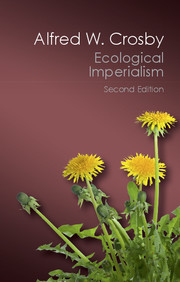Book contents
- Frontmatter
- Dedication
- Epigraph
- Contents
- List of Illustration
- Preface to the new edition
- Acknowledgments
- 1 Prologue
- 2 Pangaea revisited, the Neolithic reconsidered
- 3 The Norse and the Crusaders
- 4 The Fortunate Isles
- 5 Winds
- 6 Within reach, beyond grasp
- 7 Weeds
- 8 Animals
- 9 Ills
- 10 New Zealand
- 11 Explanations
- 12 Conclusion
- Appendix: What was the “smallpox” in New South Wales in 1789?
- Notes
- Index
- Frontmatter
- Dedication
- Epigraph
- Contents
- List of Illustration
- Preface to the new edition
- Acknowledgments
- 1 Prologue
- 2 Pangaea revisited, the Neolithic reconsidered
- 3 The Norse and the Crusaders
- 4 The Fortunate Isles
- 5 Winds
- 6 Within reach, beyond grasp
- 7 Weeds
- 8 Animals
- 9 Ills
- 10 New Zealand
- 11 Explanations
- 12 Conclusion
- Appendix: What was the “smallpox” in New South Wales in 1789?
- Notes
- Index
Summary
We have the apparent double anomaly, that Australia is better suited to some English plants than England is, and that some English plants are better suited to Australia than those Australian plants were which have given way before English intruders.
–Josph Dalton Hooker, 1853It Is Really Not Surprising that Europeans failed to Europeanize Asia and tropical Africa. They did better in the New World tropics, but fell far short of founding congeries of Neo-European societies under the blazing American sun. In fact, in many areas they did not even try, but concentrated on creating plantation colonies staffed with non-European peons, slaves, or contract laborers. What is amazing is that Europeans were able to establish themselves in large numbers in the Neo-Europes, and indeed to thrive and multiply there “as the stars in the sky, and as the grains of sand on the seashore.” This the white imperialists achieved despite the remoteness of the Neo- Europes and their many bizarre aspects – bizarre by Old World standards. Quebec may be like Cherbourg today, but in 1700 it certainly was not. San Francisco and Montevideo and Sydney may be European today, but a few – really a very few – generations ago they were without masonry or streets, and they were inhabited by Amerindians and Aborigines jealous of their lands and rights. What enabled the white intruders to make Neo-European cities of these harbors and shorelines?
Any respectable theory that attempts to explain the Europeans' demographic advance has to provide explanations for at least two phenomena. The first is the demoralization and often the annihilation of the indigenous populations of the Neo-Europes. The obliterating defeat of these populations was not simply a matter of European technological superiority. The Europeans who settled in temperate South Africa seemingly had the same advantages as those who settled in Virginia and New South Wales, and yet how different their histories have been. pointed spear? The Bantu have prospered demographically not because of their numbers at the time of first contact with whites; they were probably fewer per square kilometer than, for instance, the Amerindians east of the Mississippi River.
- Type
- Chapter
- Information
- Ecological ImperialismThe Biological Expansion of Europe, 900–1900, pp. 145 - 170Publisher: Cambridge University PressPrint publication year: 2015
- 1
- Cited by



